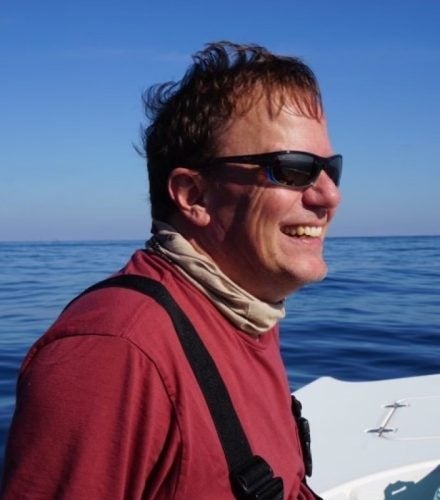By Sarah Heavren. CELS Communications Fellow
He left home with only a day pack and his bike. He hopped on a plane–the first time he’d ever flown–and traveled hundreds of miles from Indiana to Providence. He biked from the airport to Kingston, mistaking his first glimpse of Narragansett Bay as his first time seeing the ocean. Tired and cold, he arrived on campus with the setting sun. With no place to stay, he ventured to the student union, where a member of a fraternity offered him a place to sleep for the night. He crashed on the stranger’s couch, moved into his dorm the next day, and began his college career.
This is the story of Pat McShane ’85, a self-proclaimed landlubber from Indiana whose longing for the ocean drew him to URI and set him on the path to becoming a prominent admiralty and maritime attorney and partner at Frilot LLC in New Orleans. So how did a boy from Indiana develop an affinity for the sea? It was all about adventure, McShane says.
“If you want to feed your sense of adventure, find the ocean,” he said. “That is what people who lived in flat places like Indiana dreamed of. So I’m following my dream.”
To McShane, marine affairs was political science with a maritime twist–a chance to develop his analytical thinking, reading, and writing skills, as well as an opportunity to prepare himself for law school. “I came out here with an interest in the marine world because of the sense of adventure component to it. But I wasn’t really interested in science or becoming a scientist,” he said.
If getting to URI was an adventure, staying proved to be a challenge. After his first semester, McShane did not think he would be able to finance the rest of his education, and he accepted that his time at URI and by the coast was going to come to an end. However, McShane’s boss in the registrar’s office helped connect him to the right people to scrape together some funds for the rest of his first year. From there, he worked for about two years in the restaurant industry to pay his way through school.
The ocean kept calling, and McShane ventured to New Orleans to study at Tulane University Law School, a top destination for aspiring maritime lawyers. After completing his degree, he worked at a law firm in New Orleans that covered all branches of law. Six years into the job, the spirit of adventure beckoned once again, and McShane became partners in a new firm with some of his previous coworkers. He specializes in defending both maritime and energy cases, which involve ship collisions, property damage, dredge explosions, pipeline ruptures, lifeboat capsizes, and other catastrophic events. However, McShane also enjoys working directly with people on personal cases. “It keeps me grounded in ordinary folks,” he explains.
McShane found himself back at URI in early October–this time arriving by plane–to participate in “Stopping the Biggest Oil Spill You’ve Never Heard Of” as part of the Plugged into Energy lecture series. He spoke about his experience working on the Taylor Energy oil spill case, which has been largely ignored by the media. In 2004, oil began leaking from oil wells associated with Taylor Energy, a local but influential business in New Orleans. While the company claimed there were only three gallons of oil leaking per day, aerial footage suggested otherwise. Presenting alongside Timmy Couvillion and Dr. Kevin Kennelley, engineers who helped shut down the spill, McShane detailed the ensuing legal battle in which the trio took on the deep-pocket energy company. Last year, 60 Minutes featured the oil spill case as well as McShane, Couvillion, and Kennelley. “It was just a thrill,” McShane said of the experience of working on the case.
Coming back to URI felt like coming full circle for McShane, even if he did not need to bike from the airport to campus this time. One of the most heartwarming aspects of his return was having one of his former professors, Dennis Nixon, professor emeritus of marine affairs, act as the master of ceremonies for the lecture. “I’ve gone from being an ordinary student to coming back here and being celebrated for this particular accomplishment,” he reflects. He hopes to return to URI with Couvillion and Kennelley to continue telling their story, but until then, he will keep pursuing the spirit of adventure, traveling across the United States to manage cases. Looking back on the road he has traveled since leaving Indiana, McShane says, “Not bad for a kid who hadn’t been on an airplane.”

